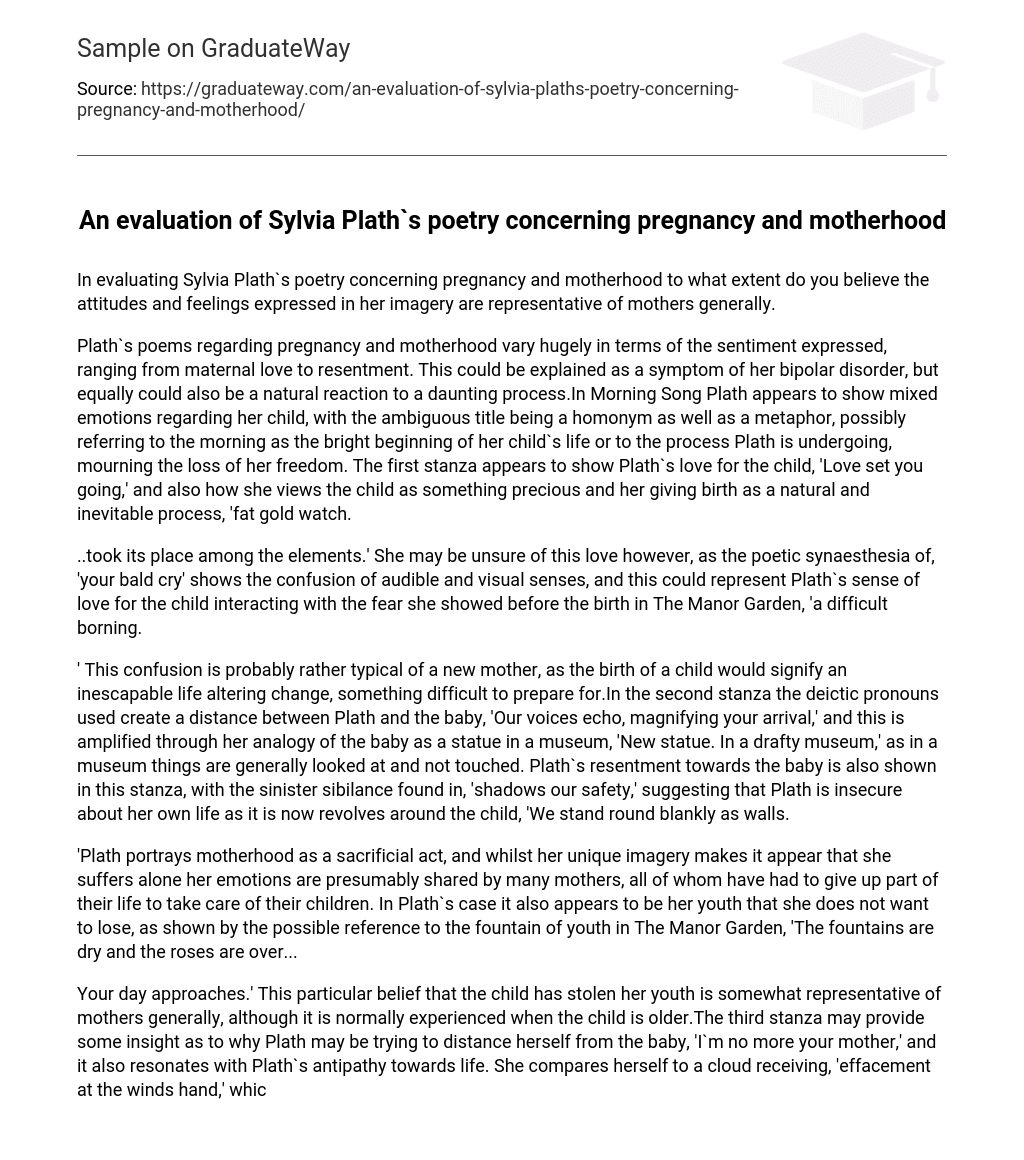In evaluating Sylvia Plath`s poetry concerning pregnancy and motherhood to what extent do you believe the attitudes and feelings expressed in her imagery are representative of mothers generally.
Plath`s poems regarding pregnancy and motherhood vary hugely in terms of the sentiment expressed, ranging from maternal love to resentment. This could be explained as a symptom of her bipolar disorder, but equally could also be a natural reaction to a daunting process.In Morning Song Plath appears to show mixed emotions regarding her child, with the ambiguous title being a homonym as well as a metaphor, possibly referring to the morning as the bright beginning of her child`s life or to the process Plath is undergoing, mourning the loss of her freedom. The first stanza appears to show Plath`s love for the child, ‘Love set you going,’ and also how she views the child as something precious and her giving birth as a natural and inevitable process, ‘fat gold watch.
..took its place among the elements.’ She may be unsure of this love however, as the poetic synaesthesia of, ‘your bald cry’ shows the confusion of audible and visual senses, and this could represent Plath`s sense of love for the child interacting with the fear she showed before the birth in The Manor Garden, ‘a difficult borning.
‘ This confusion is probably rather typical of a new mother, as the birth of a child would signify an inescapable life altering change, something difficult to prepare for.In the second stanza the deictic pronouns used create a distance between Plath and the baby, ‘Our voices echo, magnifying your arrival,’ and this is amplified through her analogy of the baby as a statue in a museum, ‘New statue. In a drafty museum,’ as in a museum things are generally looked at and not touched. Plath`s resentment towards the baby is also shown in this stanza, with the sinister sibilance found in, ‘shadows our safety,’ suggesting that Plath is insecure about her own life as it is now revolves around the child, ‘We stand round blankly as walls.
‘Plath portrays motherhood as a sacrificial act, and whilst her unique imagery makes it appear that she suffers alone her emotions are presumably shared by many mothers, all of whom have had to give up part of their life to take care of their children. In Plath`s case it also appears to be her youth that she does not want to lose, as shown by the possible reference to the fountain of youth in The Manor Garden, ‘The fountains are dry and the roses are over…
Your day approaches.’ This particular belief that the child has stolen her youth is somewhat representative of mothers generally, although it is normally experienced when the child is older.The third stanza may provide some insight as to why Plath may be trying to distance herself from the baby, ‘I`m no more your mother,’ and it also resonates with Plath`s antipathy towards life. She compares herself to a cloud receiving, ‘effacement at the winds hand,’ which could be a metaphor for how transient life (particularly hers) is, and that the cloud, ‘distills a mirror,’ may be Plath`s fear that her own illness will be reflected in her child.
This fear for her baby actually shows her love, and it is an emotion that is expressed in her other poems also, notably The Manor Garden, ‘You inherit…Two suicides, the family wolves, hours of blackness.
‘ Plath`s fear for her child`s health definitely embodies that of mothers generally, as it is an evolutionary imperative. The extent to which she is concerned with her own transience is more a reaction to her illness however, as obliteration of the self (regardless of whether this is achieved by motherhood or death) is a continuity feature of Plath`s.Plath does appear fascinated by the baby, listening to her breathe throughout the night, ‘I wake to listen: A far sea moves in my ear.’ It is unclear if this fascination is derived from love or obligation, as the metaphor that claims the baby`s, ‘moth-breath flickers,’ suggests that Plath may view her daughters fragility as persistent and irritating.
This is reiterated when Plath feeds the child, ‘Your mouth opens clean as a cat’s,’ as the simile suggests the infant is clingy and clamps down on Plath like a cat, it also shows she may see the baby as so alien it is another species entirely. This image appears less representative of mothers in general, possibly because, although annoyance at sleepless nights may be common, Plath appears to begrudge the very existence of the child.The tone of the final stanza of Morning Song is the most optimistic of the poem, as the coming morning, ‘The window square whitens and swallows its dull stars,’ implies that Plath has not only literally made it through the night but figuratively made it through the negative emotions she felt for her child, and may be ready to let them go, ‘The clear vowels rise like balloons.’ Of all of the emotions Plath expresses in the poem this is probably the one most typical of a new mother, as it is common for the resentment acquired during pregnancy to vanish when the child is born, presumably because it is far easier to love something tangible.In conclusion I believe the majority of the attitudes and feelings expressed in Plath`s poetry concerning pregnancy and motherhood are representative of all mother`s, but that Plath`s illness ensures some of the sentiment is not relatable.





